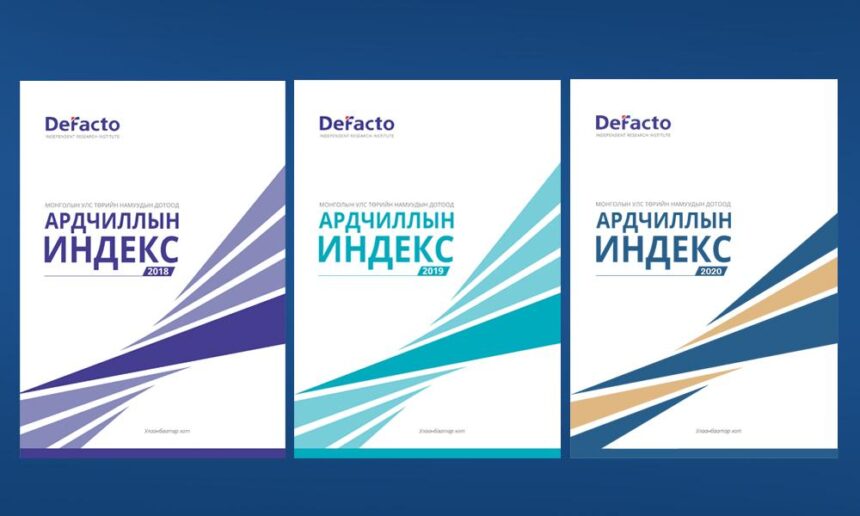For the last 30 years, Mongolians have been witnessing the importance of political parties in the country’s development. The party with the most votes in a democratic, free election receives state power. Their acquisition of the majority in the legislative body is followed by the appointment of the party leader as the head of the executive governance.
What good can the members of a party do for democracy if their party is not democratic from within? Hence, there is a pressing need for the party members and society to measure intra-party democracy and make changes.
Based on this need to increase the openness, transparency, and accountability of political parties, DeFacto Institute for policy analysis has published “The Internal Democracy Index of Mongolian Political Parties” every year since 2018.
Internal democracy assessment of political parties
The study covered relevant parties – those with seats in the parliament or the ones able to represent the voters (with at least ten percent of the votes). This included MPP, DP, MPRP, and NLP.
The internal democracy index is assessed through the party’s formal rules and their practices in real life. There are four main dimensions – participation, competition, representation, and transparency, measured on a scale of 0-100 points. Parties with scores ranging from 0 to 30 are classified as ‘non-democratic,’ those scored 31-60 as ‘semi-democratic,’ and parties with scores ranging from 61 to 100 points as ‘democratic.’
The research team conducted interviews with members from each party. Moreover, data concerning internal democracy in each party was gathered from traditional and social media sources. Finally, the researchers made assessments using questionnaires processed in four main areas.
With the 2020 parliamentary elections taking place prior, there was relatively enough data to use for the Internal Democracy Index. The parties had become more active in developing their election platforms, selecting candidates, and organizing large and small assemblies. The assessments took place between October and December of 2020.
Intra-party democracy today
The NLP with 69.7 points has topped the 2020 internal democracy index, followed by the DP with 58 points and MPRP with 57.5 points (figure.1), while the ruling MPP has fallen to the bottom with 54 points. Only the NLP was in the category of “democratic,” while the other three parties were classified as “semi-democratic.” There were no stark differences in the scores overall, but the lack of internal democracy is evident.
In 2019, the other three parties except MPP scored more than 60, while this year’s index shows a decline in the biggest three parties’ scores, putting them in the ‘semi-democratic’ category. Many of the negative aspects of internal democracy unfolded during the interviews, such as violations of party rules and excessive involvement of party leaders in the selection of candidates. It was concluded that the ruling MPP’s leadership was increasingly closed to party members.
In parties with internal democracy, members participate in big decisions such as selecting candidates, choosing a leader, developing a platform. Meanwhile, in parties with no internal democracy, all decisions are made and enforced by a few individuals consisting of leaders. Our political parties still operate like closed clubs that do not bear responsibility before their voters, the public, or even their members.
Figure 1: The Internal Democracy Index of Political Parties 2020

Tendencies of intra-party democracy
The index for the last three years shows that internal democracy has been steadily increasing for the NL party, but declining for the other three parties (figure.2). As a relatively new political party, NLP is structurally smaller than the other three and is in its early stages of development. In a party with a small number of members or a party with good rules and organization, the internal democracy is likely to be high. As this assessment was conducted after the elections, the information on internal democracy is more accurate.
Figure 2: The Internal Democracy Index of Mongolian Political Parties 2018-2020

Source: The Internal Democracy Index of Mongolian Political Parties 2020
This year’s research also sought to highlight the participation and representation of youth and women in political parties and decision-making levels. In the 2020 elections, 7.9% (6 members) of the Parliament are under 40. In the last two consecutive elections, however, 13 (17.1%) of the 76 members were women; and Mongolia lies behind the world and Asian averages in this indicator. Last year, on regional and world average, women made up 25.1% of parliament members and 20.7% of government members.
Despite playing an enormous role in the political parties’ primary and middle levels, women lie at the highest level. The big obstacle for women at the top is money. For instance, the DP has set a “deposit” of 100 million tugriks from candidates running for office in the latest parliamentary elections. Although the amount was brought down to 60 million for women, it still presents an insurmountable obstacle for them. For the youth as well, funding is the biggest barrier between them and higher levels of politics.
By international standards, political parties are the most effective structure for engaging young people and women in politics and supporting their ascension to the decision-making level. Mongolian parties do set quotas for youth and women. However, a 2020 study by the International Republican Institute (IRI) among the Mongolian youth found that political parties were the most inhospitable institutions for young people. In other words, the values and activities of our political parties do not reach the youth.
The active status of the members plays a crucial role in the development of internal democracy within political parties. Society also must push for this type of change. Because the decision-making representatives are elected through popular vote, it must be everyone’s concern whether they exercise power legitimately or not.
Follow this link to read more on the study report.

2021.01.28
Trans. by Riya.T and Munkh-Erdene.D












